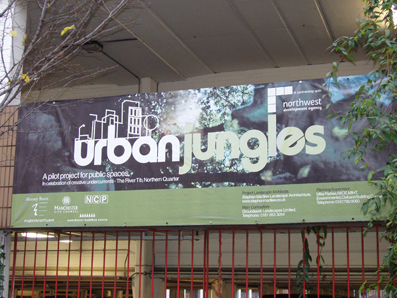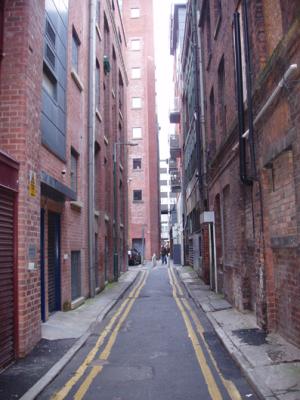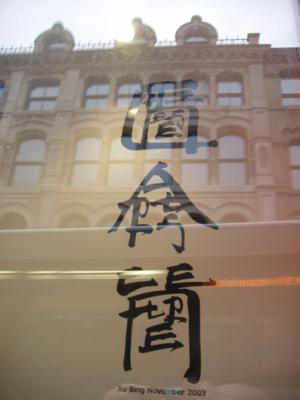Intersections 2006: A Graduate Student Creative Conference
Call For Proposals (CFP)
CFP DEADLINE: Friday, January 20th, 2006
Hosted by the students of the Joint Graduate Programme in
Communication and Culture
York University and Ryerson University
Toronto, Canada
March 24-26, 2006
EMERGING SPACES, TRANSFORMING SCAPES
We invite all interested graduate students to join us for our 5th
annual Intersections weekend Creative Conference. This year we are
especially interested in discussing the significance of both new and
established scapes, and their relationships with and connections to
imagined and physical spaces. Edges, nodes, networks, overflows,
streams: the way we imagine our world is changing. We are at a point
where it is important to reflect upon and consider older
connectivities established through non-electronic media, while at the
same time considering the potentials of new media through emerging
communication technologies. Bodies, commodities, ideas, and
technologies follow an exploding number of conduits between the local
and the global, around, through, and behind nations and
institutions.
The 2006 Intersections Conference will be the 5th annual event organized by
the York/Ryerson joint Programme in Communication and Culture. After last
year's successful conference concerning themes of HYBRID ENTITIES,
which analyzed haphazard links, mongrel formations, and mutant
compositions, we are now interested in submissions that explore
intersections where steps and solutions can be actively followed in
attempts to answer the many questions that arise when we try to create
and influence the direction of Communications and Culture. The
conference will investigate the following new spaces and modes of
movement: How and by who are these flows, networks, and disjunctures
created? By what paths do we move/think through them? Where is power,
and how does it move? Do borders, edges, and in-between spaces exist?
What happens here? Is social change or even directionality possible
within a fluid and shifting environment? What metaphors and tools can
we use to conceptualize the world and the future? What potential
exists for scapes of resistance, or opportunities to challenge present
boundaries and structures? What can we learn from the past? How can
we imagine new social formations, solidarity, and subjects positions
in the 21st Century?
Open to all graduate students, this interdisciplinary conference
welcomes submissions that take up these themes either through an
academic paper presentation, an artistic expression, or an activist
agenda. Details on subtopics and submission procedures follow below.
We encourage all interested activists and scholars to participate and
to come celebrate the Fifth Anniversary of the Intersections
Conference!!
*******************************
SUBTOPICS AND THEMES
Invited submissions include papers, artwork and activist presentations
that relate to the following broad themes:
1) Media and Culture
Topics could include (but are not limited to) cultural consumption and
production, cultures of cities, space and place, depictions of
ability/disability, media democracy, media studies, popular and visual
culture, subjectivity, representations of
class/ethnicity/gender/race/sexualities, semiotics and linguistics.
2) Technology in Practice
Submissions in this category might address (but are not limited to)
questions regarding technology's emergent role in theoretical and
practical debates surrounding art, authenticity, and aesthetics,
negotiations of accessibility and identity, race and gender,
explorations in the concepts of the cyborg, the post-human, and
technoculture. Also, issues of how the Internet and network society
is reconfiguring social formations and subject positions will be
considered as a part of this category.
3) Politics and Policy
Potential areas of focus could include (but are not limited to)
accessibility, citizenship, communication policy, copyright and
intellectual property, cultural policy, deliberations about
communication and culture and the public sphere, globalization, media
ownership in Canada, questions of structure, power and agency, privacy
and surveillance, sovereignty, and strategies of resistance.
SUBMISSION FORMAT/DEADLINES
As an expanded event, this year EMERGING SPACES will include the
following formats for disseminating and discussing ideas.
1) Paper presentations
- 15 min. presentation of an academic paper with time for discussion
to follow
2) Creative work with artist's talk
- Artwork/media for exhibition, accompanied by artist talk during
conference
3) Poster session (with possible roundtable discussion)
- Presentation of materials in a poster and/or table display with
discussant. If enough interest, these displays may be followed by a
roundtable discussion.
Although these formats are tailored to accommodate academic papers,
artwork and activist contributions respectively, all participants are
encouraged to apply for whatever format is most interesting or
appropriate for your submission.
All interested participants are asked to submit a textual abstract or
artist's statement explaining the proposed presentation in light of
the conference themes, and indicate which of the above three formats
the presentation would take.
Abstract or statement should be no more than 250 words (approx. 1
typewritten page, double spaced) and submitted via email as an
attachment in .TXT, .RTF, or Microsoft Word format.
Name and contact information should not appear on this page. Please
include a separate page with the following information:
1. Title of presentation as it appears on the abstract or statement
2. Name
3. Affiliation (program and university)
4. Level and year of study (ex. Master's, 2nd year)
5. Phone number
6. E-mail address
7. Mailing address
8. A/V requirements (computer/projector, film projector, VCR, stereo,
turntables, etc.)
9. Other requirements (table, easel, hooks, display materials). If
you have exceptional requirements for your work, please contact us to
discuss feasibility.
Artists are also asked to submit a small sample of their work for
adjudication, by either email or post.
If sending creative works by email, please submit up to 10 jpegs sized
to display onscreen or a multimedia clip with cumulative attachment
size of 5mb or less. You may also direct us to an URL. Please number
the pieces and put viewing instructions, comments and titles in your
email if applicable.
If submitting creative works by post, please mail the proposal well
before the deadline with a self-addressed, stamped envelope for return
to the following address:
Intersections, c/o Graduate Communication and Culture
3068 TEL Building, York University
4700 Keele St. Toronto, ON, M3J 1P3
You may send a CD, DVD, cued video or other multimedia, the duration
of which does not exceed 10 minutes. Alternatively, you may send up to
10 slides or printouts of work, illustrations or diagrams. Please
include a slide or media list with title, size, media, and date, and
viewing instructions for your work if applicable. Please do not send
original work.
Deadline: FRIDAY, JANUARY 20th, 2006.
Please e-mail inquiries and submissions to: intersec_at_ryerson.ca
CFP available online:
http://www.yorku.ca/cocugsa/conference.html
Presented by the Communication and Culture Graduate Students
Association (GSA):
http://www.yorku.ca/cocugsa
For more information about the Joint Programme in Communication and
Culture:
http://www.yorku.ca/comcult/


